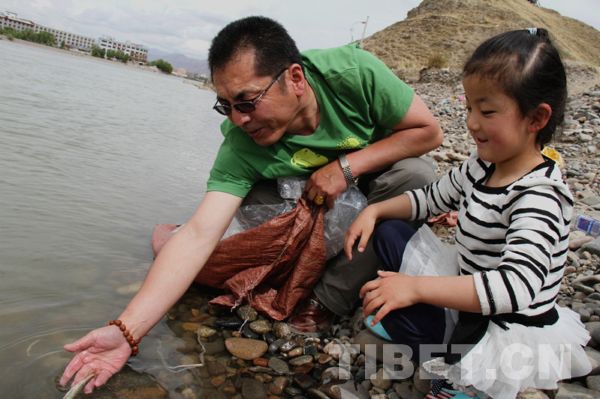
Phurbu and his niece were releasing fishes into the Lhasa River during the Sagya Dawa Festival, May 29, 2012. [Photo by Dawa Yudron/ China Tibet Online]
The family members gathered in Grandma Tsangjor's house in Lhasa in the early morning, taking out the prepared money and handed it to Uncle Phurbu.
With the chipped-in budget of 400 yuan rmb, Phurbu went to the food market with his niece, planning to buy some fish.
Uncle Phurbu lingered in front of the row of fish stall, searching for the big ones, and his 5-year-old niece was yelling for more.
The fishes were not for the lunch but for a must-do tradition of the month-long Tibetan Buddhist festival Sagya Dawa: to release the captive animals.
It is believed by the Tibetans that during the period of Sagya Dawa Festival, the virtue of 1 piece of good deed is as much as 100 thousand good deeds done in other months. According to the Buddhist scripture, freeing the captive creatures is a good deed with the supreme virtue.
"The fish must be large, so ducks won't eat them up," Phurbu explained.
With two full bags of fishes, Phurbu and his niece started off to look for a proper place along the riverside of Lhasa River in the Newu District, where the current becomes stronger and provides ideal living conditions for the released fishes.
The future of released animals was pondered by Phurbu, "People need to think thoroughly before freeing the animals, including the potential dangers. You need to think about the questions like can they survive or will anyone capture them again."
When the release ceremony began, Phurbu took out a bottle of water which was used to steep the Tibetan medicinal materials and poured it into the river, "Wish they can get back to the nature safely and healthily."
Then he muttered Buddhist sutras and released them from the plastic bags into the river, watching them swimming to the deep water.
There were more people like Phurbu and his family that bought animals from the market and release them into the nature during the Sagya Dawa Festival.
People flocked in parks like Dzongyab LukhangPark to free or feed the fishes.
Changdren, a female citizen of Lhasa saved a sheep that was about to be killed and sent it to her folks living in the village who can feed livestock.
"With mercy, people release the captive animals. It is a way to take care of all living creatures, a nature virtue of human beings, and also a respect to life," said grandma Tsangjor, an ordinary mother living in Lhasa.
